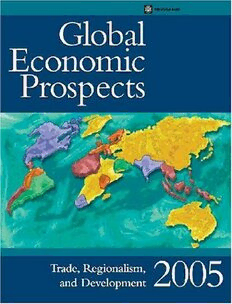Download Global Economic Prospects: Trade, Regionalism, and Development 2005 PDF Free - Full Version
Download Global Economic Prospects: Trade, Regionalism, and Development 2005 by World Bank in PDF format completely FREE. No registration required, no payment needed. Get instant access to this valuable resource on PDFdrive.to!
About Global Economic Prospects: Trade, Regionalism, and Development 2005
The proliferation of regional trade agreements is fundamentally altering the world trade landscape. The number of agreements in force surpasses 200 and has risen eight-fold in two decades. Today, as much as 40 percent of global trade takes place among countries that have some form of reciprocal regional trade agreement. Global Economic Prospects 2005: Trade, Regionalism, and Development addresses two questions: - What are the characteristics of agreements that most promote, or hinder, development for member countries? - Does the proliferation of agreements pose risks to the multilateral trading system, and if so, how can these risks be managed? The report argues that agreements leading to open regionalism--that is, deeper integration of trade as a result of low external tariffs, increased services competition, and efforts to reduce cross-border and customs delays costs--are effective as part of a larger trade strategy to promote growth. Such regional agreements can complement a strategy that, on the one hand, includes autonomous liberalization to promote productivity gains and, on the other hand, leverages domestic reforms to enhance market access. Although regional agreements can prove beneficial to member countries, they can have adverse effects on excluded countries. Lowering of border barriers around the world is crucial to minimizing these effects. The completion of the Doha Development Agenda by all countries in the World Trade Organization will reduce the risk of trade diversion associated with regional agreements and will decrease trade losses of countries excluded from agreements.
Detailed Information
| Author: | World Bank |
|---|---|
| Publication Year: | 2004 |
| ISBN: | 9780821357477 |
| Pages: | 184 |
| Language: | English |
| File Size: | 1.706 |
| Format: | |
| Price: | FREE |
Safe & Secure Download - No registration required
Why Choose PDFdrive for Your Free Global Economic Prospects: Trade, Regionalism, and Development 2005 Download?
- 100% Free: No hidden fees or subscriptions required for one book every day.
- No Registration: Immediate access is available without creating accounts for one book every day.
- Safe and Secure: Clean downloads without malware or viruses
- Multiple Formats: PDF, MOBI, Mpub,... optimized for all devices
- Educational Resource: Supporting knowledge sharing and learning
Frequently Asked Questions
Is it really free to download Global Economic Prospects: Trade, Regionalism, and Development 2005 PDF?
Yes, on https://PDFdrive.to you can download Global Economic Prospects: Trade, Regionalism, and Development 2005 by World Bank completely free. We don't require any payment, subscription, or registration to access this PDF file. For 3 books every day.
How can I read Global Economic Prospects: Trade, Regionalism, and Development 2005 on my mobile device?
After downloading Global Economic Prospects: Trade, Regionalism, and Development 2005 PDF, you can open it with any PDF reader app on your phone or tablet. We recommend using Adobe Acrobat Reader, Apple Books, or Google Play Books for the best reading experience.
Is this the full version of Global Economic Prospects: Trade, Regionalism, and Development 2005?
Yes, this is the complete PDF version of Global Economic Prospects: Trade, Regionalism, and Development 2005 by World Bank. You will be able to read the entire content as in the printed version without missing any pages.
Is it legal to download Global Economic Prospects: Trade, Regionalism, and Development 2005 PDF for free?
https://PDFdrive.to provides links to free educational resources available online. We do not store any files on our servers. Please be aware of copyright laws in your country before downloading.
The materials shared are intended for research, educational, and personal use in accordance with fair use principles.

